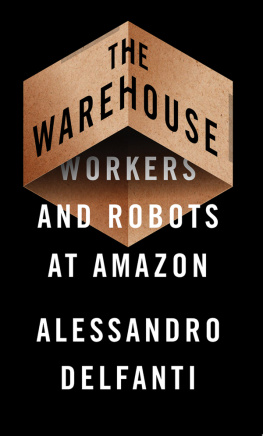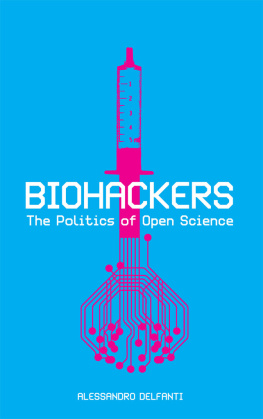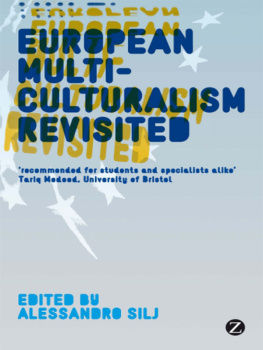The Warehouse
This accessible and richly detailed book brings together fascinating interviews with Italian Amazon workers, historical and economic analysis, and thoughtful critique.
Lisa Nakamura, the Gwendolyn Calvert Baker Collegiate Professor,
Department of American Cultures at the University of Michigan, Ann Arbor
Delfanti has done here what more critics of Amazon shouldlisten carefully to the people whose work makes the corporation function. Those of us fighting for a better future than Amazons dystopia have much to learn from this book.
Dania Rajendra, Inaugural Director, Athena Coalition
The Warehouse
Workers and Robots at Amazon
Alessandro Delfanti
First published 2021 by Pluto Press
New Wing, Somerset House, Strand, London WC2R 1LA
www.plutobooks.com
Copyright Alessandro Delfanti 2021
The right of Alessandro Delfanti to be identified as the author of this work has been asserted in accordance with the Copyright, Designs and Patents Act 1988.
British Library Cataloguing in Publication Data
A catalogue record for this book is available from the British Library
ISBN 978 0 7453 4216 0 Hardback
ISBN 978 0 7453 4217 7 Paperback
ISBN 978 1786808 64 6 PDF
ISBN 978 1 786808 65 3 EPUB
This book is printed on paper suitable for recycling and made from fully managed and sustained forest sources. Logging, pulping and manufacturing processes are expected to conform to the environmental standards of the country of origin.
Typeset by Stanford DTP Services, Northampton, England
Simultaneously printed in the United Kingdom and United States of America
Contents
Figures
A flying fulfillment center uses drones to delivery products
Augmented reality can be used to speed up labor by incorporating information about the geography of the pick tower
This augmented reality device provides supervisors with real-time information about the worker they are looking at
This system automates the division of labor between workers and robots
A note on methods
This book is based on interviews conducted between 2017 and 2021 with Amazon warehouse workers and ex-workers at different levels (from seasonal associate to manager) and in roles covering most major processes and departments. It sides with workers struggling against the company, whether because they want to improve working conditions in its warehouses, or because they want to see Amazon gone, at least in its present form. My own politics and closeness to the labor movement, as well as the fact that Piacenza is my hometown, shaped the way in which I approached this book. Interviews reflect this positioning, although I also met several workers who were not directly involved in politics or who had a positive experience of working at Amazon. Most interviews were conducted in Italy, but I also spoke with people in Canada, the United States, Germany, and Spain. Workers at the warehouses of other e-commerce companies were also interviewed. To protect the identities of my informants, I used fictitious names, did not disclose the staffing agency they worked for, changed other recognizable details such as gender, age, or job when possible, and in some cases merged more than a worker into a single character in the bookor vice versa created two characters from a single interview.
I also downloaded and analyzed tens of thousands of comments left by Amazon associates on publicly accessible websites such as glassdoor.com or Reddit, as well as YouTube videos and other content produced by warehouse workers. This material has been anonymized too. Workers were not the only sources. I conducted multiple site visits at warehouses and corporate fairs in three countries; attended both local and global trade union meetings, in some cases interviewing union organizers; spoke with members of worker-led collectives and alliances; analyzed publicly available corporate content such as training material, job ads, patents, letters to shareholders, and websites; finally, while I did not work at Amazon, I went through the selection process for a seasonal associate job and attended recruitment events in two countries. My research assistant Bronwyn Frey conducted ethnographic observations at re:MARS and other corporate events.
Acknowledgments
A number of students from the University of Toronto supported the research that went into the book: without Bronwyn Frey, Michelle Phan, Subhanya Sivajothy, Brendan Smith, Taylor Walker, and Adam Zendel this book would not exist. Erika Biddle aided with research, theory development, and in many other ways. My editor Matt Goerzen helped me develop and express my ideas: without him, this book would not even be in intelligible English. At times he worked in crunch sessions for which I am most grateful. Valentina Castellini sustained many such sessions, helping me shape, edit, and finalize the book.
The Bits, Bots, and Bytes reading group at McGill University, led by Gabriella Coleman, gave me priceless feedback on material that ended up in the book. The McLuhan Centre at the University of Toronto, led by Sarah Sharma, organized a workshop on an earlier version of the manuscript, which provided a number of great ideas and helped me fix many shortcomings. Friends, comrades, and colleagues volunteered their time to read parts of the manuscript or helped me improve it in a number of other ways, including Greg Albo, Hiba Ali, Nick Allen, Carina Bolaos Lewen, Tiziano Bonini, Olga Bountali, Antonio Casilli, Lisa Dorigatti, Nick Dyer-Witheford, Emine Elcioglu, Alessandro Gandini, Sam Gindin, Dan Guadagnolo, Omer Hacker, Into the Black Box collective, Tero Karppi, Anne Kaun, Tamara Kneese, Lilly Irani, Kira Lussier, Francesco Massimo, Rhonda McEwen, Massimo Mensi, Tanner Mirrlees, Fiorenzo Molinari, Andrea Muehlebach, Carlo Pallavicini, Julian Posada, Lilian Radovac, Nick Rudikoff, Liisa Schofield, Leslie Shade, Johan Sderberg, James Steinhoff, and Paola Tubaro.
The Institute of Communication, Culture, Information and Technology at the University of Toronto Mississauga provided the intellectual environment and material support that allowed me to write a book in the first place. Research was supported by an Insight Development Grant from the Social Sciences and Humanities Research Council of Canada, and a grant from UTMs Research and Scholarly Activity Fund. A visiting position at the Department of Social and Political Sciences, University of Milan, allowed me to conduct part of my fieldwork. Last but not least, students in my seminars let me test some of my ideas on them, often helping me craft new onesnow you know why all those research-based assignments focused on Amazon.
My friend Barbara, who many years ago moved from our hometown Piacenza to Seattle and hosted me there many times, accidentally helped me see the two cities as connected to each other. My uncle Emilio assisted me especially when I needed to make sense of economic trendsof numbers, really. A serendipitous conversation with my friend Erica kickstarted the research that led to this book. Her lived knowledge as an e-commerce worker helped me connect many dots. I must also thank my old comrade Frenchi for noting that Piacenza invented capitalism and thus must be damned, and for mercifully providing the wine needed to process this information. David Shulman at Pluto supported my work since day one and helped me turn it into a book, including by patiently dealing with many delays.














